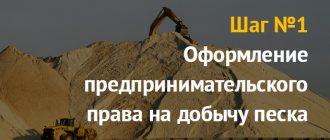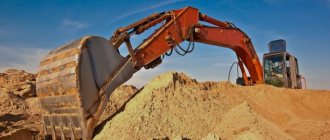All mineral resources in our country belong to the state.
The use of certain subsoil on state-owned territories is possible legally only with the appropriate license. Unauthorized unlicensed attempts to extract raw materials are fraught with criminal liability. Sand is one of the most popular types of raw materials.
Sand is an indispensable material in construction and other areas of life. It is also subject to special rules for obtaining mining permits.
Illegal sand mining is, of course, a good business, but, above all, it is a criminal offense, for which you can even get a real prison sentence.
Current requirements for sand mining
So, the main question in this situation is whether a license is needed for sand extraction? Sand is classified as a mineral, which indicates that its extraction must be strictly licensed.
The country's environmental prosecutor's office monitors the legality of the use of all subsoil resources, including sand.
The relevant regulations reflect the categories of those entities that have the right to freely carry out sand extraction without obtaining a license for this type of activity.
These include:
- Companies mining sand within the boundaries of a mining or geological land allotment. For them, the main requirement is only the presence of a record in OKVED about the conduct of such activities.
- Owners of gardens, vegetable plots and personal plots. Their activities will be considered legal until they leave the boundaries of their site when extracting sand, trying to steal sand from a neighbor.
Sand mining is an attractive type of business. That is why commercial activities for the extraction and sale of sand are strictly licensed.
In order to start sand mining, you need:
- Obtain a license to carry out this type of activity;
- Open an individual entrepreneur or legal entity;
- Have ownership rights to the cultivated area or permission to use it from the owner of this territory.
To engage in sand mining, you must have special equipment, sand quarry development specialists and surveyors. Without all this, it will be simply impossible to extract sand.
But the most important thing is rights . Illegal sand mining is grounds for administrative and criminal liability.
Sand mining on agricultural lands is strictly prohibited. These lands have a completely different purpose and should not be exploited to support commercial sand mining.
What is a license
This is a document that authorizes an individual or legal entity to conduct certain activities legally. The license confirms the qualifications. Accordingly, when turning to a licensed specialist, a person can be sure that he will be provided with services of the appropriate level. Carrying out medical activities without a license entails a fine.
The current legislation of the Russian Federation obliges all private clinics, pharmaceutical companies and other medical institutions that conduct medical practice on a paid basis to obtain a license. It is a criminal offense to engage in private medical practice illegally. Moreover, the choice of preventive measure depends on the presence/absence of damage caused to the patient’s health.
How to get a license
To obtain permission to conduct medical activities, a medical education or an appropriate certificate is required. The latter is issued to persons engaged in healing activities. The validity period of a healer's diploma is 3 years. No medical education is required.
The legislation of the Russian Federation prohibits healers from conducting ordinary medical practice. The activities of folk doctors are subject to strict control. Therefore, when complaints are received, appropriate checks are initiated, as a result of which the healer may be deprived of his license.
Permission is issued to legal entities for an indefinite period. This is stated in Article 5 of Federal Law No. 99. To obtain a license to conduct medical or pharmaceutical activities, a private clinic must meet the following criteria:
- Availability of a lease or purchase and sale agreement for premises that will be used to receive patients.
- Availability of necessary equipment and tools.
- Each specialist working in the clinic must have a diploma confirming their qualifications.
- The premises must comply with established sanitary standards.
Responsibility for illegal sand mining
Responsibility for this crime is assigned based on the nature of the violation of the law and the damage caused.
When sand mining is carried out in a prohibited area, the object of the action is the safety of the environmental area.
When sand mining occurs without the necessary documentation, this crime is classified as illegal business activity.
The object in this case is the subsoil, which has suffered certain damage that requires compensation in favor of the state.
Depending on the volume of illegally mined sand, administrative liability may be imposed under Art. 8.13 Code of Administrative Offenses of the Russian Federation or criminal (Article 255 of the Criminal Code of the Russian Federation).
When assigning punishment and classifying a crime, the motives for the crime are not taken into account. Only the direct or indirect intent of a person who has reached the age of 16 matters.
Administrative responsibility
In Art. 8.13 of the Code of Administrative Offenses of the Russian Federation, Part 3 specifies responsibility for illegal sand mining near water bodies.
According to this provision, a violator may face:
- For an individual, a fine of 1,500 rubles is established;
- For the head of an organization, a fine of 3,000 rubles;
- For a legal entity, a fine of 30,000 rubles.
In addition, the Code of Administrative Offenses of the Russian Federation contains another article under which an entity that extracts sand without the appropriate permit can be held liable.
This is part 1 of Art. 7.3, according to which the attacker faces:
- For an individual, a fine of 5,000 rubles;
- For the head of an organization, a fine of 50,000 rubles;
- Legal entity fine from 800,000 rubles to 1 million rubles.
Also, if the interests of individual citizens or their property have been damaged by illegal sand mining, they can file claims for compensation for damage caused in a civil manner.
Criminal liability
Sand extraction is an illegal method without a valid license under Art. 255 of the Criminal Code of the Russian Federation is punishable by:
- Fine up to 200 thousand rubles;
- A fine in the amount of the convicted person’s income for up to 18 months;
- Deprivation of the right to hold certain positions or conduct certain activities for a period of up to 3 years;
- Compulsory work up to 480 hours;
- Correctional labor for up to 2 years.
According to Art. 171 of the Criminal Code of the Russian Federation on illegal business activities provides for liability for unauthorized sand mining:
- Fine up to 300 thousand rubles;
- Mandatory work up to 480 hours;
- Arrest up to 6 months.
If there is a qualifying crime in the form of receiving a particularly large profit, a fine of 80 thousand rubles is also added to the term of imprisonment of 5 years.
In addition to income on an especially large scale, the article specifies participation in the commission of a crime by an organized group as aggravating circumstances.
Compensation for damage to the state
Subsoil is the property of the state . If there is even administrative material against the guilty person, his guilt in the act is presumed by default. On this basis, he is obliged to compensate to the budget the amount of damage that he caused to the state through his actions.
This amount includes:
- Cost of unauthorized sand reserves;
- Costs of restoring the consequences of illegal mining.
The fact is that those persons who extract sand legally pay the appropriate tax to the budget . By not receiving taxes from illegal miners, the state compensates for the damage caused.
Levels of state geological supervision and supervision over the rational use of subsoil
The very fact of illegal mining, which leads to damage to the subsoil, is revealed during state geological supervision, as well as supervision over the rational use of subsoil.
At the same time, the legislator distinguishes two levels of state geological supervision - federal and regional (clause 3 of the Regulations on state supervision of geological exploration, rational use and protection of subsoil (hereinafter referred to as the Regulations on Geological Supervision) (approved by Decree of the Government of the Russian Federation dated May 12, 2005 No. 293)).
State geological supervision at the federal level is carried out by Rosprirodnadzor and its territorial bodies. At the regional level, such supervision is carried out by specially authorized executive authorities of the constituent entities of the Russian Federation (for example, the Ministry of Natural Resources of the Republic of Tyva). At the same time, regional supervision covers the extraction of mineral resources and groundwater in a volume of no more than 500 m3 per day (clause 3 of article 2.3 of the Subsoil Law).
How to obtain a sand mining permit?
Obtaining permission to mine sand is a long and complex process. Before obtaining a license itself, approval is required from the local government authority allowing work to be carried out in a specific area.
If a plot of land is privately owned, then its alienation is possible only with consent to the allocation of land for subsoil use.
The necessary documents for sand mining are the same list that is required to obtain a license. These include:
- Application for obtaining a license indicating the details of the legal entity, site data, purposes of sand extraction with reference to the work project.
- Copies of certificates of ownership of equipment that will carry out production.
- Data from the financial statements of a legal entity.
- Documents confirming the qualifications of the personnel who will directly extract sand.
- Extract from the Unified State Register of Ownership or long-term lease for this plot.
- A copy of the receipt for payment of the state duty.
- Copies of statutory documentation.
- Certificate from the tax office confirming the absence of debts.
- Confirmation of the presence of a surveyor at the enterprise or an agreement with an outsourced surveyor.
The license cannot be transferred to a third party.
It is important to reflect the project financing structure. The commission should not have any questions regarding how much money you have for this.
If you receive a loan for sand mining, provide all loan documentation.
How much does a license to extract sand from a quarry cost? The price of the license, if you submit documents yourself, will be limited only by the state fee in the amount of 7,500 rubles.
If you decide to resort to the help of specialists who will independently collect and submit documentation for a license without your participation, you will have to pay a lot more - more than 100 thousand rubles.
Jurisdiction of claims for compensation for damage to subsoil
Typically, claims from supervisory authorities for compensation for damage to subsoil are considered by arbitration courts according to the rules of claim proceedings, since unlicensed mining is directly related to the implementation by subsoil users of their main business activities.
However, there are precedents when prosecutors file appropriate claims in courts of general jurisdiction and they are accepted for proceedings. The courts, in response to statements from subsoil users about violation of the rules of jurisdiction, indicate that the prosecutor has the right to file a claim for recovery of damage to the subsoil in a court of general jurisdiction, and not in arbitration, since he is not a participant in business activities (resolution of the Presidium of the Trans-Baikal Regional Court dated May 16, 2021 No. 44G44/2019).
Grounds for challenging claims for damages related to damage to subsoil
Judicial practice has developed a number of grounds that entail a reduction in the requirements declared by supervisory authorities, or a full refusal to satisfy such requirements.
Such grounds include:
- failure to establish guilt: mineral extraction was carried out before the land plot was leased to the subsoil user (resolution of the Arbitration Court of the Volgo-Vyatka District dated December 5, 2016 in case No. A116722/2015);
- the supervisory authority incorrectly calculated the volume of exported minerals, incorrectly applied the formula for calculating damage to the subsoil (resolution of the Arbitration Court of the East Siberian District dated 08/06/2018 in case No. A1911709/2017) (damage was calculated as not resulting in the loss of mineral reserves);
- it has not been proven that it was the person’s equipment that was used in the illegal extraction of minerals (resolution of the Arbitration Court of the Far Eastern District dated July 5, 2017 in case No. A0410781/2016);
- the supervisory authority overestimated the volume of unlicensed extracted minerals when calculating damage (resolution of the Arbitration Court of the Far Eastern District dated November 21, 2018 in case No. A0496/2018) (the volume of OPI shipped to third parties in the product range does not coincide with the calculation of the supervisory authority);
- damage was caused to the subsoil (groundwater) in a state of extreme necessity - Art. 1067 of the Civil Code of the Russian Federation (resolution of the Arbitration Court of the West Siberian District dated 02/08/2018 in case No. A753268/2017) (the need to provide the population with drinking water);
- the court did not give a legal assessment of the actions of the co-defendants and did not determine the degree of guilt of each of them (resolution of the Arbitration Court of the Volga District of September 25, 2018 in case No. A1218782/2017) (actual unlicensed mining was carried out by the contractor, and not by the license holder).
The case of illegal developers went to court
The Privolzhsky District Court registered on June 20 a criminal case against entrepreneur Airat Nabiullin and two former employees of the Ministry of Ecology of Tatarstan. The court hearing is scheduled for July 23. The case will be considered by Irek Kamartdinov, who previously tried in court the mass riot of prisoners in IK-2 in March 2021, and recently acquitted the Kazan state registrar in a bribery case.
But let's get back to his new business. Realnoe Vremya wrote more about him back in August 2021. Let us remind you that former and current employees of the Ministry of Ecology, according to investigators, “protected” the illegal development of a quarry in the village of Otary, next to Columbia Industrial Park LLC. Initially, the total amount of bribes transferred by the “black” digger was 240 thousand rubles, but later it increased to 326 thousand rubles. Interestingly, employees of the Ministry of Ecology themselves handed over “theirs” to law enforcement officers, who suspected something was wrong after unsuccessful raids in Otary - local residents complained about illegal development, but they could not catch the violator even during sudden checks. This gave rise to the assumption that information was being leaked by someone from the ministry.
The investigation believes that from April 2015 to July 2017, entrepreneur Airat Nabiullin illegally mined sand for sale, and ex-employee of the Central Territorial Administration of the Ministry of Ecology of the Republic of Tatarstan Ruslan Shakirzyanov helped him avoid responsibility. Who, in turn, according to the investigation, received information about the raids from a senior specialist of the State Inspectorate for Environmental Supervision of the Ministry of Ecology of the Republic of Tatarstan Rinat Khabibullin.
Local residents complained about illegal development, but it was not possible to catch the violator even during sudden inspections
Forms of compensation for damage caused to subsoil
There are two forms of compensation for damage caused to the ecological environment (subsoil, soil, water and biological resources), namely:
- recovery of damages in monetary form;
- compensation for damage in kind by taking measures to restore the damaged state (reclamation).
The procedure for carrying out reclamation work on land plots is determined by the order of the Ministry of Natural Resources of Russia and Roskomzem dated December 22, 1995 No. 525/67 “On approval of the Basic Provisions on land reclamation, removal, preservation and rational use of fertile soil layer.”



